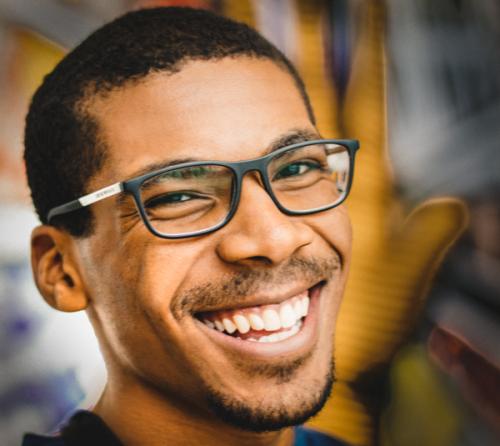Each year NAAEE and the U.S. Fish and Wildlife Service recognize the EE 30 Under 30: individuals in the U.S., Canada, and Mexico, 30 years old or younger, who are creating real change in their communities through the power of environmental education. These young environmental educators are shaping the future of EE. The profile below is adapted from NAAEE's new platform for stories of EE impact: impact.naaee.org.

Charles Orgbon
Founded an environmental nonprofit at age twelve
Charles Orgbon, college senior and CEO of Greening Forward, was chosen as one of the NAAEE 30 Under 30 last year. The annual award is given to young people ages 15-30 who are environmental education leaders in their community.
People don’t often look to young people to solve big problems, but NAAEE and Charles Orgbon are changing that.
When he was in the fifth grade, Charles Orgbon, like many grade-school kids, had to fulfill a community service requirement. “I wanted an A, and I wanted to do it the easiest way possible, so I stayed after school and the principal gave me gloves and a plastic bag to pick up litter,” says Orgbon, now 21 years old. After picking up candy wrappers and plastic cups in his schoolyard, he went on the web and learned about the costs of littering. “I thought to myself, we have to stop this!,” says Orgbon. “It was an easy concept for a kid to understand—that litter is bad for a community. Litter was my gateway drug too, because I soon learned about other environmental issues.”
Most kids have a moment like this, says Orgbon. Most kids have an experience where they realize that something in their community is not right, but they don’t have an opportunity to follow up on it. Orgbon started an NGO at the age of 12, and he quickly realized that the environmental movement didn’t engage young people like him as much as they could, so now his organization, Greening Forward, funds youth-led environmental projects. The idea goes hand-in-hand with the NAAEE 30 Under 30, which selects young applicants from all over the country who are raising their voices and changing policy in their communities—from building community gardens, to fighting for social justice. Winners attend the annual NAAEE conference in Madison, Wisconsin, where they are put in touch with mentors and thought leaders.
Charles Orgbon was selected for 30 Under 30, and also served as a keynote speaker at the conference last year, because he’s a “shining example” of a young person who got involved in his community, and gives other young people the push to do the same. “He has an amazing story,” says Christiane Maertens, deputy director of NAAEE, but she says that he also gets what environmental education is all about: “Our work is about helping people young and old make informed decisions and take action. If we don’t have the next generation doing that, then we’re not doing our jobs.”
Orgbon’s NGO, Greening Forward, is now the largest youth-driven environmental organization in the country. Greening Forward has given away over $5,868,000 in grants to youth-driven environmental projects, which have collectively planted 300 trees, and recycled 180 tons of waste. Not bad for Orgbon-- who is just about to graduate from college.
The power that young people bring to environmental causes, Orgbon says, is that they’re not jaded. “I think that young people look at big problems and are less phased by them,” says Orgbon. “In 5th grade I said, ‘I’m going to free the world from litter.’ How naïve that might have been! But what it symbolizes is an innate sense of curiosity, and a willingness to act.”
Orgbon believes that ambitious young people need three things to succeed: a spark to want to make change, three cheerleaders to help them along, and an opportunity. NAAEE helps provide the mentors and the opportunities to help young people make change, by inviting them to the conversation with experts and thought leaders. “Conferences like the NAAEE’s are where minds come together. When a young person comes in with a wicked solutionencounters a wicked problem likesuch as climate change, they he or she can connect with experts similar minds who say, ‘This is how you respond, this is what you do next,’” says Orgbon. “So many young people have ideas—they just don’t know how to take them to the next level.”
Orgbon credits the connections he made at the NAAEE conference with helping him grow Greening Forward’s goals and supporting even more youth-inspired, youth-led projects, like one he’s working on now in Georgia, where a 15-year old young woman woman that he has been mentoring is lobbying state lawmakers to introduce a statewide plastic pollution awareness day.
“Young people have a sense of curiosity, a willingness to ask,” he says. “There’s a fearlessness there—I think that’s how we move the needle forward.”